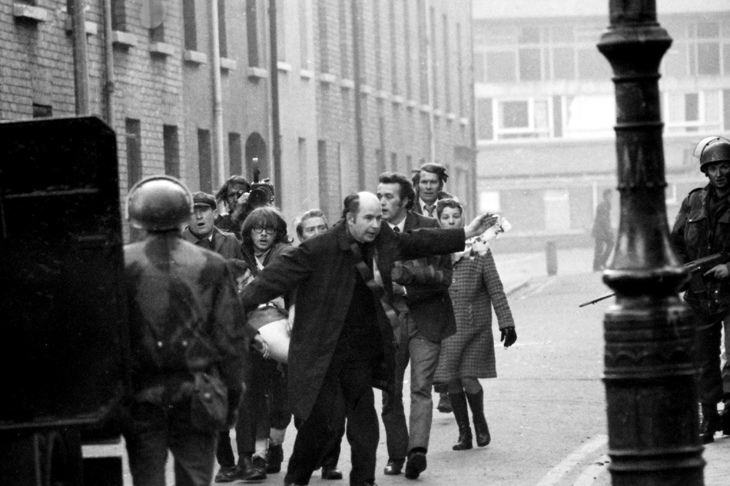In my 2010 short story ‘Prepositions’, a woman has lost her husband not in 9/11 but on 9/11 — when coming to the aid of a family whose distress had nothing to do with the World Trade Center. Composed as a letter to a friend whose husband did indeed perish in the Twin Towers, the narrator expresses her dismay at being left to a lonely, private grief, while her friend’s loss is heralded in grand ceremonies in lower Manhattan every year. The point: some deaths count more than others. While all bereavements haunt on an individual level, publicly only a small, elite subsection of fatalities is exalted as especially terrible, unbearable and unjust.
Memorialized by U2, dramatized on-screen by Paul Greengrass, parsed in detail by countless full-length documentaries, including a BBC Radio 4 broadcast only last year, enjoying the premier pride of place in the litany of outrages against Northern Irish nationalists, dissected by no fewer than 30 books, and emblazoned on thousands of T-shirts still available online, the Parachute Regiment’s killings of 14 protesters on Bloody Sunday may still stir the grief of loved ones 47 years on, but you couldn’t say these losses have been ignored.
Nor could the British government be accused of obliviousness. The roundly disparaged Widgery Tribunal was followed by Saville, a 12-year, £200 million legal feeding frenzy — the longest in British history — whose resultant 5,000-page document of 2010 broadly exonerated the civilian victims and cast the Paras as having lost control. Was that enough? No! The Police Service of Northern Ireland (PSNI) took the baton thereafter, and instigated a criminal investigation. Whether the province’s Prosecution Service will charge a number of soldiers for crimes including murder in 1972 is announced this week.
This magazine goes to press before that decision goes public. Advance coverage predicts that charges will be brought. But whichever way it goes, the North’s authorities should never have contemplated prosecution in the first place.
There’s no statute of limitations on murder. Hounding ex-soldiers now in their sixties and seventies may seem pointless, just as the hunt for the very last remaining Nazis who suffer from chronic drools and now confuse ‘eugenics’ with an exercise program has sometimes seemed a bit futile. Yet I accept that for Jews the pursuit of Hitler’s minions even into their senile dotage might mean something. Thus I also accept that for Irish nationalists prosecutions even of increasingly elderly former soldiers who fired on that march in Derry could also feel potently symbolic.
But the problem is not that these ex-Paras are old, or that Bloody Sunday was a long time ago. The problem is a discrepancy so perverse that it qualifies as the jurisprudential version of mentally ill. The problem is the Good Friday Agreement.
I have a vengeful streak. In 1998, the aspect of that agreement I found hardest to swallow was its wholesale release of paramilitary prisoners. I thought the concession constituted a glaring moral hazard: whack your wife with a rolling pin in the heat of an argument and you’re put away for life; intentionally slaughter your fellows in cold blood, and as long as it’s for a ‘cause’ you’ll be back home in time for tea. Post–agreement, convicted IRA murderers literally laughed as they left the dock, smug in the certainty that in short order the court would have no choice but to set them free. I realize that only the inclusion of prisoner release made the agreement possible, but the moral compromise was enormous. This expedient deal with the devil showed no respect for the feelings of the families who’d lost relatives to Northern Irish terrorism. They just had to suck it up. In which case, sorry to be so brutal, but the families of Bloody Sunday’s victims should have to suck it up, too.
Northern Ireland secretary Karen Bradley’s clumsy assertion that British soldiers couldn’t be guilty of ‘crimes’ was ludicrous. Folks in uniform do bad things, too; hence the expression ‘war crimes’ — duh. But Bradley might better have articulated that the security forces’ purpose is the preservation of order, while the terrorist’s purpose is mayhem. Structurally, they are not on a moral par. I wasn’t in Derry in 1972, and I’ll no more read 5,000 pages of inquiry testimony than I’ll plough through Theresa May’s entire Withdrawal Agreement. Thus I’m willing to accept at face value Lord Saville’s conclusion that the Paras exercised culpably poor judgment. But unlike many an IRA or UVF member, they didn’t set out to kill anyone that afternoon. So if we’ve issued a de facto amnesty to the deliberately murderous — including the culprits on the run to whom Blair sent ‘comfort letters’ — then we unquestionably owe the same let’s-call-it-a-day to former soldiers in the British army. After all, the IRA always claimed to be an army, too. At the end of a conflict, combatants are discharged on all sides.
The PSNI’s theatrical criminal investigation is more bending over backwards to seem impartial in relation to the crimes of the state, except that this investigation is partial. Patted on the head and sent on their way with all forgiven, the terrorists are pottering in allotments. Fifty years after the fact, retired British soldiers have been quaking this week, in fear of formal arrest. I reached for it earlier, but the word ‘perverse’ feels too small. The application of such a flagrantly iniquitous double standard seems an act of self-hatred. Ergo, it’s painfully British.
The army has a recruitment problem, which they have signally failed to solve with their Operation Snowflake ad campaign, whose posters addressed ‘Me Me Me Millennials’, ‘Binge Gamers’ and ‘Phone Zombies’. Especially after the relentless and, for the legal profession, cynically profitable persecution of soldiers who served in Iraq, what’s likely to bulk the numbers of young people willing to serve in the army isn’t a cheesy appeal to generational clichés, but some assurance that if they put their lives on the line for their country they won’t be hung out to dry.
This article was originally published in The Spectator magazine.


















